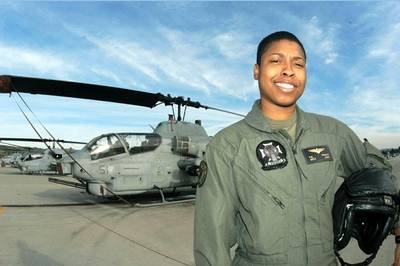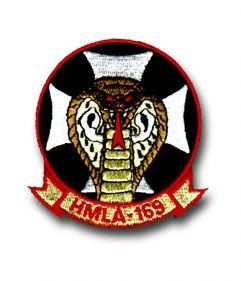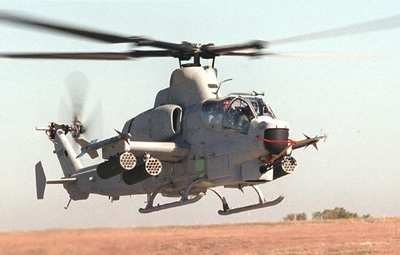Pendleton Home To Trailblazing Avaitor
Those who have spent enough time with 1st Lt. Vernice Armour
will tell you there are two distinctive sides to the 29-year-old
Marine Corps officer. One is an intensely competitive, openly
confident athlete; the other is a quiet but self-assured Super
Cobra pilot.

In the latter capacity, Armour is a high-flying example of
social progressiveness in the U.S. military - the first-ever
African-American female combat pilot. But most people don't realize
it amid her quiet composure.
Athletic Background
As an athlete, Armour is one of Camp Pendleton's most notorious
- having won back-to-back titles in the female division at the
annual Strongest Warrior competition in 2001 and '02, and
ultimately the base's 2001 Female Athlete of the Year Award.
For good measure, the multi-sport athlete played running back
for the San Diego Sunfire women's professional football team during
the 2001 season.
During athletic competitions, Armour, a Memphis, Tenn., native,
is anything but demur.
By contrast, in her role as a Marine, Armour is an altogether
different person. The confidence is still there, but she is much
more reserved in her approach to her job.
For Armour, competing for sports trophies is fun stuff. But
flying missions for Marine Light Attack Helicopter Squadron 169 is
strictly serious business - especially with the clock counting down
to deployment and her first potential date with combat.
First Female USMC Combat Pilot Ready For War
Although she admits to being nervous about the possibility of
going to war, Armour says her training has thoroughly prepared her
for impending conflict.
"It's OK to be a little nervous," Armour says. "When the time
comes, we'll all be prepared for whatever we have to do - that's
what we've been training for."
After graduating from Middle Tennessee State University in 1997,
Armour, fresh off a stint as an Army reservist, joined the Marines
in October 1998 - "to be in the best fighting organization in the
world." She was "winged" in early July 2001 and arrived at Camp
Pendleton later that same month.
In March 2002, Armour earned distinction as the Department of
Defense's lone African-American female combat pilot and was
assigned to HMLA-169.
 Armour says being a Marine has "been a great
experience" that has "helped build my sense of independence, my
leadership abilities and self-reliance."
Armour says being a Marine has "been a great
experience" that has "helped build my sense of independence, my
leadership abilities and self-reliance."
Role Model
Armour's broad shoulders not only carry the weight of being a
part of U.S. military history, but also of a role model for future
generations who will follow in her boot tracks.
She says her trailblazing career has come without any special
help or hindrances.
"I haven't been treated any differently or received any more
special attention than anybody else just because I'm an
African-American or because I'm a woman," says Armour. "The
training I've received is the same as my male counterparts, and
I've advanced through the (flight training) program just the same
as everyone else.
"I don't look at this on the basis of gender or color. I'm a
Marine Corps officer first, then I try to be the best officer that
I can, and try to take care of the Marines in my charge the best
way I can," added Armour, who expects to pin on captain's bars in
April.
Armour hasn't shrunk away from her role model status.
"I've put more pressure on myself because I want to succeed, and
I want to be the best that I can be. I realize that I'm a role
model, and there's more pressure with that, because I do want to
set the right example for young people out there, whether they are
a boy or a girl, or whether they are black or white. There is more
pressure when you try to do that, because you always want to make
sure that you are doing the right thing."
Despite the added pressure, Armour welcomes the challenge of
both combat aviation and her social-icon status.

Better Than Average
"I do want to be that positive role model, I relish it," she
says. "If you do what average people do, you have what average
people have. I don't ever want to be average. That's what I
challenge kids to do - be better than average."
Lt. Col. Lloyd Wright, HMLA-169's executive officer,
acknowledges that Armour, like anyone else who can make the grade
as a Marine combat pilot, is anything but average.
"To be a Marine Corps pilot, you have to work hard and have
dedication to your goals; obviously, Lt. Armour is a good example
of that, " says Wright.
Armour is almost euphoric when describing training to become a
Super Cobra pilot.
"It's been great - just awesome," she says, noting her
squadron's time spent on developing warfighting skills may soon
come to the test.
"We're ready. We train for this every day - to protect our
nation and its freedoms - and right now we're getting ready to do
just that. Some people who have had a 20-year career have never had
the opportunity to do what we're about to do."
Wright confirmed Armour is ready to put her training to the
test.
"Lt. Armour, just as every Marine here in this squadron, has
worked hard over the last few months to train for this," Wright
said. "She is anxious to validate the traits and capabilities and
combat tasks she has learned."
Before heading off to parts unknown, Armour offered this bit of
advice to the nation's young men and women:
"Don't let anyone dash your hopes and dreams. Decide what and
where you want to be and take positive steps to get there," she
said.
"Research what it is you want to do, take an interest in it and
go for it. Work hard to keep your dreams alive."
Armour also offered her fellow Marines some advice:
"Stay the course," she said. "Be true to yourself and the Corps,
and make the right decisions to get where you want to be."
 ANN FAQ: Contributing To Aero-TV
ANN FAQ: Contributing To Aero-TV Aero-News: Quote of the Day (12.10.25)
Aero-News: Quote of the Day (12.10.25) ANN's Daily Aero-Term (12.10.25): North Atlantic High Level Airspace (NAT HLA)
ANN's Daily Aero-Term (12.10.25): North Atlantic High Level Airspace (NAT HLA) Airborne 12.08.25: Samaritans Purse Hijack, FAA Med Relief, China Rocket Fail
Airborne 12.08.25: Samaritans Purse Hijack, FAA Med Relief, China Rocket Fail Airborne-Flight Training 12.04.25: Ldg Fee Danger, Av Mental Health, PC-7 MKX
Airborne-Flight Training 12.04.25: Ldg Fee Danger, Av Mental Health, PC-7 MKX





